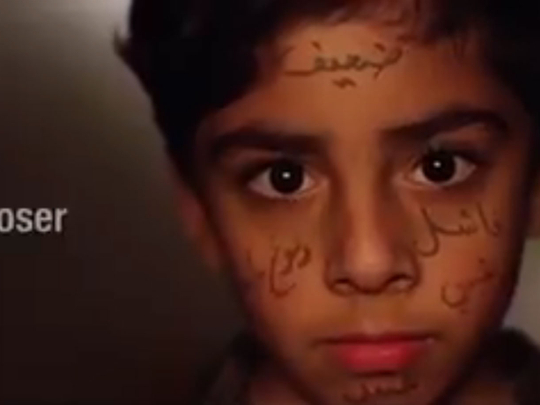
Dubai: Be it physical, verbal, emotional, or online, the act of bullying can take shape in a number of different ways.
But all of them will lead to the same consequences.
To prevent children from becoming a victim, the Ministry of Education (MoE) has organised the National Bullying Prevention Week from April 22-28, to raise awareness on how pupils should respond to bullying.
Hessa Bint Eisa Bu Humaid, Minister of Community Development, posted a video on her Twitter account to shed light on how cyberbullying takes place.
The video was accompanied with the caption: “Bullying can take many forms of verbal or physical abuse, whether it is an individual against an individual or group against an individual, and with time, that kind of repeated unjust behaviour can harm a person.”
التنمر هو الاستغلال المُتَعمد للقوة، يتخذ أشكالا ًعدة من إساءة لفظية أو جسدية سواء كانت من فرد ضد فرد أو مجموعة ضد فرد، ويكون سلوك ظالم متكرر مع الوقت يهدف إلى إيذاء أحد الأشخاص أو ممارسة الضغط عليه #الإسبوع_الوطني_للوقاية_من_التنمر #معاً_نزدهر @MOEducationUAE @MOCDUAE pic.twitter.com/dWzZBejcjf
— Hessa Buhumaid (@HessaBuhumaid) April 22, 2018
More than 20 government entities have also been taking part in this week’s campaign.
شاركها مع أبنائك👨🏻💻 قم بتوعيتهم 💛 #الأسبوع_الوطني_للوقاية_من_التنمر
— هيئة تنظيم الاتصالات (@TheUAETRA) April 23, 2018
.
Share it with your kids👨🏻💻 Aware them💛#هيئة_تنظيم_الاتصالات #aeCERT #التنمر #التنمر_الإلكتروني pic.twitter.com/Cjj6pBriV0
Throughout the week, trained educators and consultants have been visiting public and private schools to highlight the different ways a child can be bullied, what is cyber bullying and what the characteristics of a bully are.
In a 2015 survey carried out by the International Journal of Preventive Medicine Research of the American Institute of Science, it showed that out of 1,054 students in the UAE, 40 per cent had been victims of bullying and that 85 per cent of the cases occurred on school campuses.
Jameela Al Muhairi, Minister of State for Public Education, explained that bullying has short and long-term effects on victims, on the education system and on the wider society, are far more profound than previously believed.
“Bullying negatively affects students' educational performance and their emotional and mental growth. For example, repeated name-calling, teasing and physical assault are often causes for increased absenteeism among those students who feel vulnerable, insecure and alienated," she said.
Cyber-bullying in numbers
A survey carried out Kaspersky Lab and B2B International in 2016 also revealed that 24 per cent of adults in the UAE do nothing to protect their chidlren from internet threats, despite the fact that a staggering 42 per cent of them have seen their children encounter actual threats online, including viewing inappropriate content, stumbling across dangerous strangers and cyberbullying.
Up to 61 per cent also fear that the Internet is affecting their kids’ health or wellbeing in some way.
“For many young people today, using mobile phones and computers to go online, often out of sight of their parents or while out and about, has become an integral part of daily life. Our study suggests that a significant number of parents feel powerless about managing what happens on these devices,” said David Emm, Principal Security Researcher at Kaspersky Lab.
“However, there are many simple yet positive things parents can do to protect the young people in their care. The important thing is to combine practical measures, such as installing parental control software and keeping computers in family areas, with talking to our children about potential threats and how to deal with them,” he said.












